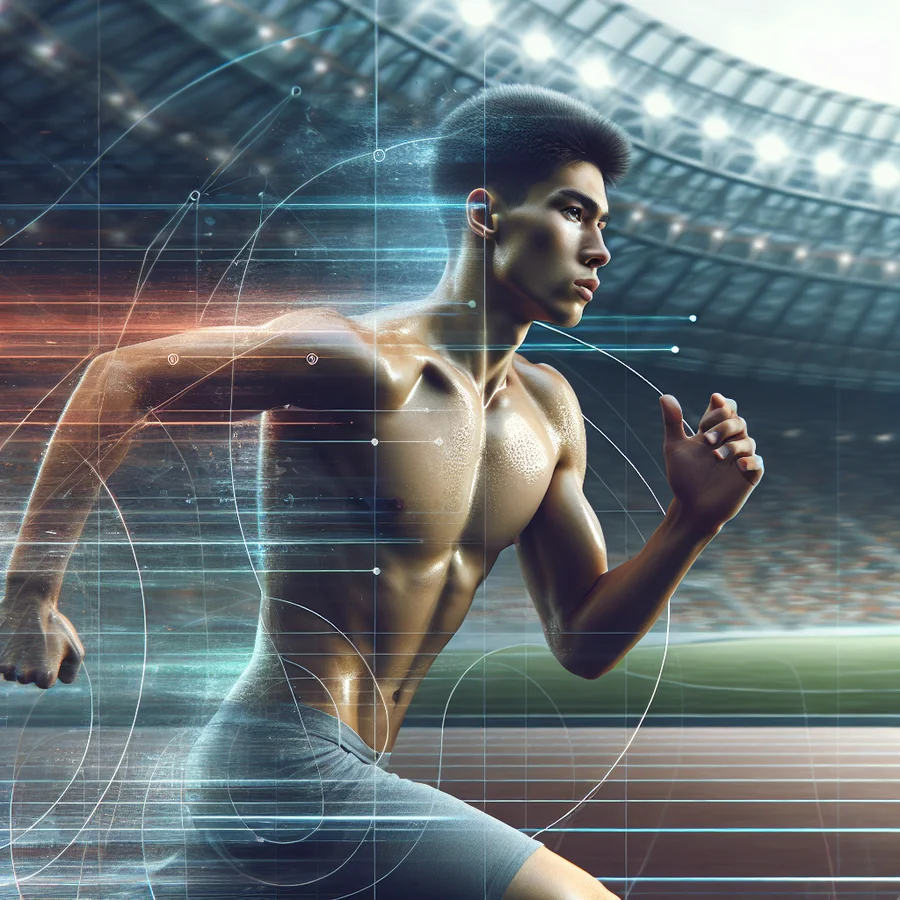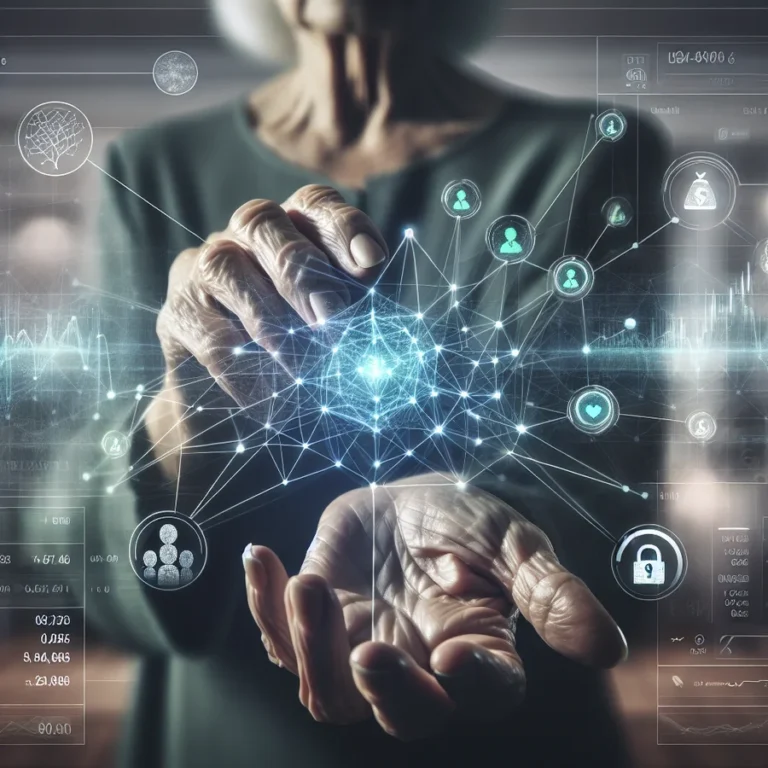AI in Sports: Analyzing Performance and Enhancing Fan Engagement
Artificial intelligence (AI) is changing the game in sports. It’s not just about robots playing soccer. AI is now helping athletes train smarter, teams strategize better, and fans experience sports in exciting new ways. This guide explores how AI in sports is revolutionizing the industry, from performance analysis to fan engagement.
Imagine coaches using AI to analyze player movements and predict injuries. Think about fans getting personalized content and immersive virtual reality experiences. This is the reality of sports today, and it’s only going to get more advanced. Let’s dive into the world of AI in sports and see how it’s transforming the games we love.
The Evolution of AI in Sports
Sports analytics has come a long way. It started with simple stats and manual data collection. Now, AI and machine learning are processing huge amounts of data quickly. This uncovers hidden patterns and insights, leading to smarter decisions and enhanced fan experiences. The evolution of AI in sports is truly remarkable.
Early adoption of AI in sports focused on performance analysis and athlete training. Motion tracking technology like Hawk-Eye in tennis and SportVU in basketball captured player movements with great accuracy. This provided valuable data for coaches to optimize training and develop strategic game plans. AI’s role has consistently grown since then.
How AI is Revolutionizing Sports Performance
AI is transforming how athletes train and perform. It offers personalized, data-driven insights. This helps players improve, stay healthy, and recover faster. From custom training to injury prevention, AI’s impact on individual performance is reshaping sports organizations.
Let’s explore the specific ways AI is boosting sports performance:
- Performance Tracking and Analysis: Wearable devices track speed, distance, heart rate, and fatigue levels. Coaches use this data to make informed decisions about training and game strategies.
- Injury Prevention: AI analyzes historical data and identifies risk factors for injuries. Teams can then implement personalized training and recovery plans.
- Game Strategy Optimization: AI analyzes vast amounts of game data. This helps coaches develop tailored game plans that exploit opponents’ weaknesses.
These are just a few examples of how AI is enhancing sports performance. The possibilities are constantly expanding.
Data-Driven Training with AI in Sports
AI is enabling personalized training, nutrition, and recovery programs for athletes. Each athlete is unique. Their role within a team is also unique. Careful attention to each athlete’s well-being ensures optimal performance. It also reduces the risk of injury through overtraining. AI in sports is helping to make this possible.
AI-enabled sports equipment, like smart helmets, can transmit data about head impacts. AI and machine learning algorithms then determine when a player should reduce or avoid contact practices. This enhances player safety. In martial arts, augmented and virtual reality training allows athletes to practice against high-quality opponents, even remotely.
Game Film Analysis and AI in Sports
Machine learning algorithms can analyze game footage. These algorithms speed up the video review process. They allow for the aggregation of hundreds of data points about a player’s performance within minutes. This vastly improves analysis efficiency. AI in sports is making this process more efficient than ever before.
When sports analysts aggregate data, they can identify player and team trends. This information helps sports teams improve their game strategy optimization and individual and team performance. These improvements can now be made almost instantly through the integration of AI technology.
AI in Sports: Enhancing Fan Engagement
AI isn’t just for athletes and coaches. It’s also transforming the fan experience. Personalized content, augmented reality, and interactive applications are taking fan engagement to new heights. AI algorithms analyze user preferences to curate tailored content, enhancing the viewing experience.
Here’s how AI is revolutionizing fan engagement:
- Personalized Experiences: AI enables teams to deliver personalized experiences to fans. By analyzing fan data, teams can tailor marketing campaigns, promotions, and content.
- Enhanced Viewing Experiences: AI is transforming how fans consume sports content. AI algorithms analyze game footage in real-time, providing personalized highlights and statistics.
- Social Media Engagement: AI helps teams analyze social media interactions and sentiment. This allows them to tailor their content and engagement strategies.
These advancements are creating a more immersive and engaging experience for sports fans.
AI-Driven Virtual and Augmented Realities in Sports
AI-driven virtual and augmented realities are revolutionizing the way fans experience sports. They bring games to life in unprecedented ways. Game footage and player performance analysis are used to create immersive experiences. This allows fans to feel like they are part of the action. AI in sports is truly enhancing the viewing experience.
These technologies enable fans to experience historical moments in sports in a new light. They offer perspectives that were previously impossible. Whether reliving a legendary game or experiencing a key moment from an athlete’s viewpoint, AI-driven virtual and augmented realities are opening up new dimensions of engagement.
Personalizing Fan Interactions with AI in Sports
Sports teams are increasingly leveraging AI-enabled platforms to personalize fan interactions. This offers a new level of engagement. By analyzing fan preferences and behaviors, these platforms can deliver personalized content. For example, they can provide game highlights tailored to individual interests. They can also streamline ticket purchasing with recommendations and offers. AI in sports is making the fan experience more convenient and enjoyable.
Facial recognition technology is improving stadium security and entry processes. It also offers the potential for personalized greetings and offers once fans are inside the venue. This level of customization is transforming the fan experience, making it more engaging, convenient, and memorable.
AI in Sports: Predictive Analytics and Sports Betting
The sports betting industry was an early adopter of sports analytics. Sports betting companies utilize models that compute win/loss probabilities. They also compute the probabilities of hundreds of other potential scenarios. Combining player statistics, team performance statistics, and machine learning, analysts are able set odds that lean in the favor of the sports betting company.
Similarly, other organizations use predictive analytics to enhance fan engagement, facilitate injury prevention, or provide a competitive edge. There is likely no area of the sports industry that has not been touched by predictive analytics. AI in sports is changing the way we bet and analyze games.
The Business Side of AI in Sports
Implementing AI-enhanced operations can improve multiple processes from a sports business perspective. From resume review to taking meeting minutes, utilizing AI tools frees up time for sports professionals to focus on high-level business issues. Generative AI can also be instrumental in the development of presentations. For instance, AI tools can aggregate data more quickly and create aesthetically pleasing slide decks.
Reducing time spent on repetitive tasks such as analyzing data allows for innovation and continued growth within the entire sports industry. AI in sports is not just about the game; it’s about improving the business behind it.
AI-Enhanced Fan Experience and AI in Sports
AI is taking the fan experience to a new level, whether those fans are watching from home or sitting in a stadium. When organizations are leveraging AI, they can give fans instant access to personalized stats, replays, and real-time insights that make the game more exciting. For example, AI can recommend highlights based on favorite players or teams and offer tailored content to fans.
At the stadium, AI has improved everything from finding the best seats to adding interactive displays that get fans even more involved in the game. It’s bringing people closer to the action and making the whole sports experience more fun and engaging. AI in sports is enhancing the overall fan experience.
The Use of AI-Powered Cameras in Sports
The advent of AI-powered cameras has enhanced the way in which coaches explore game data and how broadcasters share information with fans. An AI-powered tracking system is used in major sports leagues. This technology allows for an immense amount of additional information to be shared with fans, which boosts fan engagement.
Similarly, sports journalism has been forever changed by the interactive AI features available within a broadcast. From player performance data to heatmaps showing shots, data generated from AI technologies has become ubiquitous in sporting broadcasts and provides fans with greater access to their teams than ever before. AI in sports is transforming how we watch and analyze games.
AI in Sports: Officiating and Fair Play
AI is playing a crucial role in officiating and ensuring fair play in sports. It improves the accuracy of calls and decisions. This benefits teams and fans alike. By analyzing game strategy and player movements with precision, AI technologies are supporting referees and officials in making more informed decisions. This enhances the integrity of the game. AI in sports is helping to ensure fair play.
AI-enhanced cameras can be helpful for game officials. They act as video assistant referees to help game officials. They can also serve as line judges in tennis, using different camera angles and AI systems to make decisions with almost 100% accuracy. This ensures more accurate game outcomes. Similarly, AI can determine if a player is offside in soccer with enhanced precision, reducing human error.
Customer Service Improvements with AI in Sports
AI tools are really changing the way sports fans interact with customer service. Whether it’s getting quick answers to questions or finding the best seats for a game, AI products enable sports teams and venues offer better service to fans. AI in sports is improving customer service in many ways.
With chatbots instantly handling inquiries and offering personalized suggestions for everything from seats to merchandise, fans get a smoother, more tailored experience. Chatbots and other AI products allow for immediate, real-time responses to fans’ queries. Even if it is 3 a.m., chatbots can answer customer inquiries in real time.
AI tools can recommend the “best” seat for particular customers, based on sports fans’ historical data. AI technologies can also provide advertisements for products or add-ons that fans are statistically most likely to buy. AI algorithms may even recommend a future game to attend, based on a sports fan’s propensity to go to games at a certain time or date. This type of data analysis can be completed within seconds to provide personalized recommendations to the consumer.
Many larger sports arenas and stadiums are beginning to move away from traditional metal detectors in their entry screening. These outdated detectors are being replaced by magnetic or radio wave scanning devices that utilize AI technology to compare images to a database of weapons. This new technology significantly speeds up the security line and no longer requires fans to remove anything metallic from their pockets.
Facial recognition technology has also become common at sports events. This advanced system helps to ensure that people banned from a stadium do not enter it and ruin a game for other fans. AI in sports is improving stadium access and security.
Challenges and Considerations for AI in Sports
As AI technologies become more integrated into sports, the importance of data protection cannot be overstated. The collection and analysis of vast amounts of data, including personal information from athletes and fans, raise significant ethical concerns. For athletes, data privacy is critical, especially when it comes to biometric data and performance metrics.
The misuse of this data could lead to unfair advantages, discrimination, or even career-threatening decisions based on algorithmic predictions. Sports organizations must implement robust data protection measures to ensure that athlete information is secure and used ethically. For fans, AI’s ability to analyze behavior and preferences raises concerns about privacy. Organizations need to communicate how fan data will be used and ensure compliance with data protection regulations.
Despite the potential benefits, several barriers hinder the adoption of AI technologies in sports organizations. These challenges include cost, training, and cultural resistance. Implementing AI solutions often requires significant investment in technology, infrastructure, and skilled personnel. The successful integration of AI technologies demands a workforce that is knowledgeable about data analytics and AI applications.
The Future of AI in Sports
The future of AI in sports is bright. It holds endless possibilities for enhancing nearly every aspect of the sports industry. Most teams, leagues, and sports management professionals now utilize AI in their respective sectors. As the cost to access AI technologies decreases, utilization will increase in turn.
The ability of sports managers to utilize data analytics and to be proficient in data science will facilitate an understanding of AI in sports. There are truly no limits to the number of uses for AI in the sports industry; we are only limited by our own creative capacity.
Emerging Trends in AI in Sports
As AI continues to evolve, several emerging technologies are poised to transform the sports landscape. Key trends include advanced analytics and AI coaching. The future of sports analytics will see a shift from traditional metrics to more sophisticated models that incorporate machine learning and AI. These advanced analytics will enable teams to gain deeper insights into player performance, game strategies, and opponent behaviors.
The integration of AI into coaching practices is on the rise. AI systems can analyze game footage to provide coaches with actionable insights, such as player positioning, tactical adjustments, and opponent weaknesses. Additionally, AI-driven virtual coaching assistants can offer personalized training recommendations, monitor player progress, and suggest modifications to enhance skill development. AI in sports is constantly evolving.
Building a Sports Ecosystem with AI
The potential for partnerships between tech companies, sports organizations, and educational institutions is vast. Collaborations can drive innovation and foster a robust ecosystem that supports the development and application of AI in sports. By partnering with universities and research centers, sports organizations can tap into a pool of talent and research expertise.
Initiatives such as internships, workshops, and joint research projects can help cultivate a skilled workforce equipped to handle AI technologies. The establishment of tech incubators focused on sports innovation can drive the development of unique solutions that address specific challenges in the sports industry. These incubators can serve as platforms for networking, knowledge exchange, and technological advancement. AI in sports requires a collaborative ecosystem.
Conclusion
AI in sports is no longer a futuristic concept. It’s a present-day reality that’s reshaping the industry. From enhancing player performance and preventing injuries to creating immersive fan experiences, AI is revolutionizing the way we play, watch, and manage sports. As technology continues to advance, the integration of AI will only deepen, offering new opportunities for athletes, teams, and fans alike. The future of sports is data-driven, personalized, and more engaging than ever before.
Frequently Asked Questions
How to use AI in sports training?
AI in sports training involves using data-driven insights to optimize athlete performance. This includes analyzing player movements, speed, and acceleration to create personalized training programs. AI-powered wearable technology monitors real-time performance data to assess fatigue and injury risk, allowing for more tailored and effective training regimens.
What is the future of AI in sports?
The future of AI in sports includes enhanced performance analysis, advanced predictive analytics for strategic planning, and integration of virtual and augmented reality for training and fan experiences. Smart sports equipment with AI sensors will provide more accurate performance tracking. However, this advancement also challenges data privacy and ethical considerations in sports betting and officiating.
How can AI be used in football?
AI in football is used for player safety through systems that simulate injury risks and create personalized prevention programs. It’s also used for performance analysis, strategic decision-making, fan engagement through real-time stats and highlights, officiating assistance, and player evaluation for drafting purposes.
What AI is used in sports?
AI in sports encompasses various technologies, including machine learning, data analytics, and predictive modeling. In major sports leagues, AI powers platforms that process vast amounts of data per season. Other sports use AI for player performance analysis, automated highlight generation, pitch analysis, and tactical analysis.






